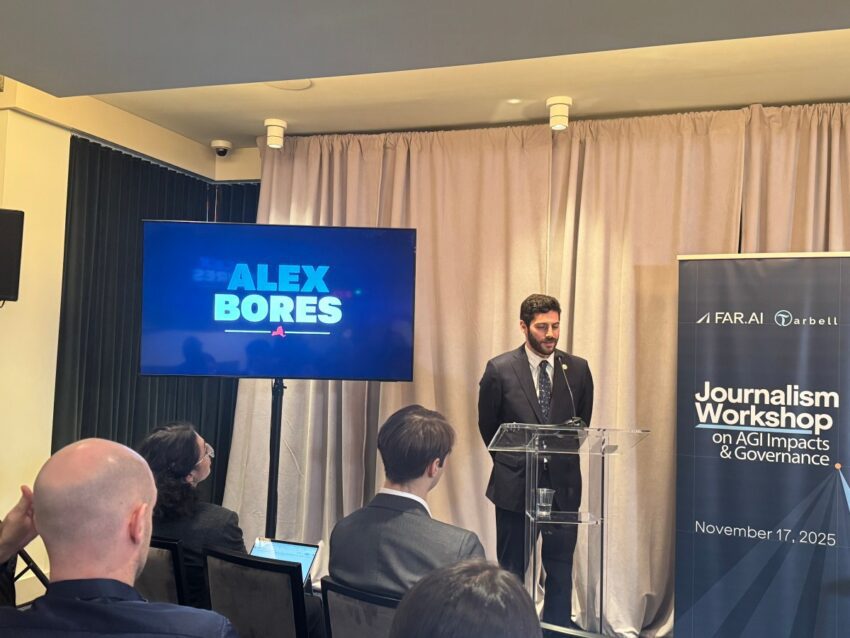
a16z-backed super pac is targeting alex bores A super PAC backed by Andreessen Horowitz, OpenAI, and other tech leaders has targeted New York Assembly member Alex Bores’ congressional campaign, marking its first attack against a lawmaker supporting AI regulation.
a16z-backed super pac is targeting alex bores
Background on the AI Safety Bill
In recent years, the rapid advancement of artificial intelligence has raised significant concerns regarding its implications for society. Legislators across the United States have begun to grapple with the need for regulatory frameworks to address these challenges. In New York, Assembly member Alex Bores has emerged as a prominent advocate for AI safety, sponsoring a bill aimed at establishing guidelines for the ethical use of AI technologies.
The AI safety bill proposed by Bores seeks to create a comprehensive framework that ensures accountability, transparency, and safety in AI applications. This legislation is designed to address concerns about bias in AI algorithms, data privacy, and the potential for job displacement due to automation. Bores’ initiative reflects a growing recognition among lawmakers that proactive measures are necessary to mitigate the risks associated with AI technologies.
The Role of the Super PAC
The super PAC targeting Bores is backed by influential figures in the tech industry, including venture capital firm Andreessen Horowitz and OpenAI, a leading organization in AI research and development. This coalition of tech leaders has been vocal in its opposition to stringent regulations that they believe could stifle innovation and hinder technological progress.
Super PACs, or political action committees, are organizations that can raise and spend unlimited amounts of money to advocate for or against political candidates. They are often used to amplify the voices of specific interest groups, and in this case, the tech sector is mobilizing to counteract what it perceives as overreaching regulatory efforts. The involvement of high-profile tech investors and companies underscores the stakes involved in the ongoing debate over AI regulation.
Implications of Targeting Bores
The decision to target Alex Bores represents a significant escalation in the battle over AI regulation. By launching an attack against a sitting lawmaker, the super PAC is sending a clear message to other legislators considering similar measures. The implications of this campaign could be far-reaching, potentially deterring other lawmakers from pursuing AI safety legislation out of fear of facing similar backlash.
Moreover, the financial resources available to the super PAC allow it to mount a sustained campaign against Bores, which could significantly impact his congressional campaign. As a relatively new politician, Bores may not have the same level of financial backing as his opponents, making him particularly vulnerable to well-funded attacks. This situation raises questions about the influence of money in politics and the ability of grassroots candidates to compete against well-funded adversaries.
Stakeholder Reactions
Supporters of AI Regulation
Supporters of Bores and his AI safety bill have expressed concern over the super PAC’s actions. Many advocates for responsible AI development argue that regulation is essential to ensure that AI technologies are deployed ethically and do not exacerbate existing social inequalities. They contend that the super PAC’s campaign is an attempt to silence voices calling for accountability in the tech industry.
Organizations focused on digital rights and ethical technology have rallied behind Bores, emphasizing the importance of legislative oversight in the face of rapid technological change. They argue that without proper regulations, the potential harms of AI could outweigh its benefits, leading to negative consequences for society as a whole.
Opponents of AI Regulation
On the other side of the debate, opponents of the AI safety bill argue that excessive regulation could stifle innovation and hinder the growth of the tech industry. They assert that the current pace of technological advancement requires a more flexible approach to regulation, one that allows for experimentation and adaptation rather than rigid guidelines.
Tech leaders involved in the super PAC have articulated their belief that the market should dictate the development of AI technologies, rather than government intervention. They argue that innovation thrives in an environment free from bureaucratic constraints, and that overregulation could lead to the United States falling behind other countries in the global tech race.
The Broader Context of AI Regulation
The targeting of Alex Bores is part of a larger narrative surrounding the regulation of emerging technologies. As AI continues to evolve, lawmakers worldwide are grappling with how to balance the benefits of innovation with the need for oversight. In Europe, for example, the European Union has been at the forefront of efforts to establish comprehensive AI regulations, aiming to create a framework that prioritizes safety and ethical considerations.
In contrast, the United States has seen a more fragmented approach to AI regulation, with individual states taking the lead on various initiatives. This lack of a cohesive national strategy has led to a patchwork of regulations that can create confusion for businesses and consumers alike. The actions of the super PAC targeting Bores may further complicate this landscape, as they could discourage lawmakers from pursuing unified regulatory efforts.
Looking Ahead: The Future of AI Regulation
The outcome of the super PAC’s campaign against Alex Bores could have significant implications for the future of AI regulation in the United States. If Bores is successful in his congressional campaign despite the attacks, it may embolden other lawmakers to pursue similar initiatives. Conversely, if the super PAC’s efforts succeed in undermining Bores’ candidacy, it could deter future legislative efforts aimed at regulating AI technologies.
As the debate over AI regulation continues, it is essential for stakeholders to engage in constructive dialogue about the potential benefits and risks associated with these technologies. Finding common ground between advocates for regulation and those who prioritize innovation will be crucial in shaping a future where AI can be harnessed for the greater good while minimizing potential harms.
Conclusion
The targeting of Alex Bores by a super PAC backed by prominent tech leaders highlights the contentious nature of the debate surrounding AI regulation. As lawmakers navigate the complexities of this issue, the actions of the super PAC serve as a reminder of the significant influence that money and power can wield in the political arena. The outcome of this campaign may not only impact Bores’ future but also set a precedent for how AI regulation is approached in the United States moving forward.
Source: Original report
Was this helpful?
Last Modified: November 18, 2025 at 7:39 am
1 views















